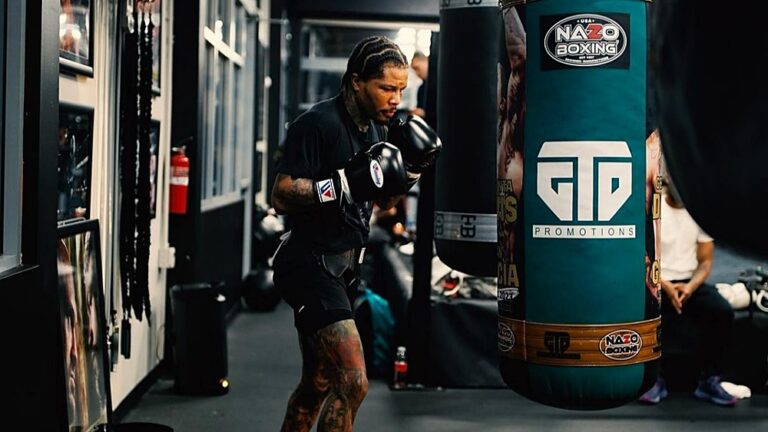20 Double-End Bag Drills To Add To Your Boxing Training Routine

Guest post by Evolve MMA, Asia’s premier championship brand for martial arts with the most number of World Champions on the planet. Named as the #1 ranked martial arts organization in Asia by CNN, Yahoo! Sports, FOX Sports, and more, Evolve MMA is the best gym to learn Boxing in Singapore.
The double-end bag is a tool you can’t afford to ignore when it comes to sharpening your boxing skills. This unique training tool gives you a dynamic and unpredictable target, making it perfect for developing speed, timing, accuracy, and reflexes.
Often confused with speed bags, the double-end bag is excellent for improving your precision, punch accuracy, timing, combinations, and hand speed. Double-end bags are attached to the floor on one end while the other end is attached to the ceiling so the target area is suspended on both ends. This allows the target to move freely after each strike, forcing you to land your punches on a moving target. It gives you a more realistic feel of what it’s like inside the ring when you’re trying to land punches on an opponent.
Improve Your Boxing Skills With These 20 Double-End Bag Drills
An effective way to get the most out of boxing drills is to mimic the format of competitions. Strike the double-end bag for three minutes and rest for a minute before moving on to the next round. Let’s dive into 20 drills that will take your boxing to the next level:
1) Jab Mastery
Start by focusing solely on your jab. Throw a series of fast, sharp jabs at the bag. Your goal is to hit the bag squarely with each jab, improving your accuracy and hand speed. Keep your movements fluid and your other hand always guarding your face.
2) Power Cross Practice
Switch to the cross after working on your jab. Emphasize power in each strike. Rotate your rear foot and hip to generate force. This drill improves the accuracy of your cross and improves your ability to stay balanced as you transfer your weight from one foot to another.
3) Jab-Cross Combo
Combine your jab and cross in a classic one-two punch combination. Focus on the rhythm and fluidity of moving from one punch to the next. Ensure each hand snaps back to the guard position immediately after striking the target.
4) Hook Drills
Work on your hooks, both left and right. Aim to connect with the round part of the bag, simulating an opponent’s head or body. Pay attention to your form, keeping elbows bent and pivoting your feet.
5) Uppercut Focus
Uppercuts can be tricky against a double-end bag. Practice throwing uppercuts, focusing on your form and timing to connect with the swinging bag.
6) Four-Punch Combos To Six-Punch Combos
Start combining punches in fours – for example, jab, cross, hook, uppercut. Once, you are familiar with the four-punch combination, try the six-punch combination. This drill enhances your ability to throw quick, consecutive punches while maintaining good form.
7) Slip And Strike
Incorporate head movement. Slip to the side, then counter with a punch. This drill improves your evasive maneuvers and counter-punching abilities. Repeat the process for three minutes.
8) Dodge And Counter
Practice dodging an imaginary punch and then follow up with a counter-attack. This movement is crucial for evading incoming attacks and countering effectively. Take a look at how Boxing legend Floyd Mayweather practices this drill.
9) Double Jab Practice
Throw double jabs before pulling back. It’s a great way to improve your speed and ability to quickly reset for the next move.
10) Body Shot Simulation
Focus on throwing body shots. Bend slightly at your knees and pivot to simulate a body shot, aiming at the lower part of the bag.
11) Feint And Strike
Work on feinting – a quick shoulder, foot, or hand movement done to trick your opponent – followed by a quick, accurate punch. Feinting is one of the most underrated aspects of boxing training. It’s almost impossible to land clean punches on a trained boxer so make drills that involve feints a regular part of your training.
12) Combination Building
Start building longer combinations. String together different punches in sequences of five or six. This drill enhances your creativity and stamina.
13) Rhythm And Timing
Focus on your rhythm. Hit the bag, then move with it, finding the right time to strike as it swings back toward you.
14) Speed Drills
Execute short bursts of rapid-fire punches, focusing purely on speed. This explosive training increases your hand speed and reaction time.
15) Footwork Integration
Integrate footwork into your double-end drills as you become more comfortable with them. Circle the bag while throwing punches, maintaining your stance and balance. This drill is excellent for developing agility and spatial awareness.
16) Power Punching
Throw power punches at the bag and try to catch it with another power punch as it swings back toward you. This drill helps to improve your ability to throw accurate power punches at a moving target.
17) Defensive Maneuvers
Incorporate defensive maneuvers like parries and blocks in between your strikes. This drill helps to sharpen your defensive skills. Hit the bag and use one of your defensive tools to avoid getting hit by it as it returns toward you.
18) Endurance Rounds
Simulate a full boxing round. Maintain a consistent pace, throwing various combinations and employing defensive tactics throughout. Aim for at least as many rounds as your next scheduled match is for.
19) Accuracy Training
Focus on hitting the same spot consistently as the double-end bag moves away from and toward you. This drill improves your precision, ensuring your punches land where intended. Try to catch the bag every single time it swings toward you. It’s a lot harder than it looks.
20) Cool-Down
Finish with a cool-down session. Throw light, slow punches, focusing on form and breathing. This helps with muscle recovery and reinforces proper technique.
Give The Double-End Bag A Try
You’ll notice improvements in various aspects of your boxing game when you start working with a double-end bag. It’s an excellent tool for simulating a moving opponent, and, with consistent practice, you’ll develop faster, more accurate, and more powerful strikes.
Having powerful punches as a boxer will only take you so far when you don’t have the timing, accuracy, and technique required to land clean punches on a trained opponent.






